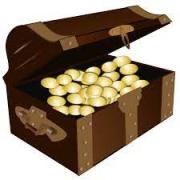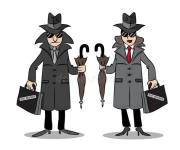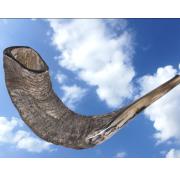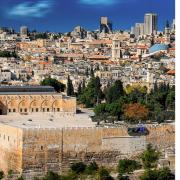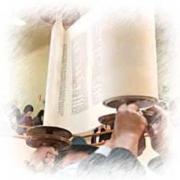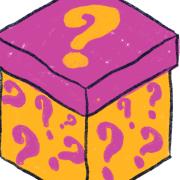Я выбрал не зря это название. Недавно прослушав одну из лекций Раввина Жэйкобсона которая натолкнула меня на новое понимание, мне хотелось бы поделиться с вами вот с такой идеей.
В Главе Ваера, есть рассказ, как приходят три ангела к Лоту и говорят ему что его город Содом будет разрушен утром и он должен покинуть его. И вот во время побега, Ангелы предупреждают Лота и его семью не отворачиваться назад несмотря ни на что. Но Лота жена услышав голос одной из своих подруг, отворачивается и становится солёным столпом.
Интересно почему солёным столпом и почему она наказана солью? В Мидраше есть одно из объяснений, что так-как она согрешила из-за соли, когда пошла по соседям выпрашивать соль говоря что у неё нет соли и у них сейчас гости, этим намекая что её муж в данный момент нарушает закон города принимая гостей и этим призывая жителей принять меры по отношению к пришельцам. Убегая она услышала голос одной из своих подруг, и в этот момент произошёл закон мера за меру - так как она просила соль, этим побудив жителей восстать против пришельцев и в данный момент они умирали в городе, они позвали её, давая ей понять что она тоже не может спастись, потому-что она побудила их сделать грех. Как говорят мудрецы Содом сидел очень глубоко в жене Лота.
Но вопрос почему она стала солью? Давайте немного углубимся в этот эпизод, чтоб ответить на этот вопрос.
Когда Ангелы подошли к Лоту и сказали ему о планах Вс-вышнего, то первым делом Лот подошёл к своим зятьям и передал им о своих намерениях и пригласил их покинуть город с ним вместе, так как к утру он будет разрушен.
В Берешит 19:14 сказано: "И пошёл Лот к своим зятьям и говорил он с ними, к тем которые были женаты на его дочерях и сказал он им: Поднимайтесь, покиньте это место, потому что Вс-вышний разрушит этот город. Но он выглядел для своих зятьёв шутом."
Первый раз через столько лет Лот понял одну вещь, что насколько бы высоко он не находился на социальной лестнице, и какую бы позицию он не занимал, он всё же оставался пришельцем и тем самым жидом и всё той же насмешкой для неевреев. Вроде бы Лот достиг всего что можно было иммигранту достичь - Мидраш говорит, что он был главным судьёй города Содома, и выносил приговоры по делам в городе. Его дочки достигли пика их подъёма - выйдя замуж за парней из этого города. Вроде бы Лот уже один из них - но не тут то было. Зятья его высмеивают, и не идут с ним и за своими жёнами. Такое же повторялось у нас истории. Вроде мы часть общества где мы живём, занимаем большие позиции, имеем богатство и хорошее расположение, но приходит время и туман рассеивается.
И вот они бегут, жена Лота обернулась и превратилась в солёный столп. Почему она не умерла как все остальные жители Содома? За всю историю человечества, миллионы людей умерли - злодеи, деспоты и люди совершившие всякие преступления и благие дела, все были преданы земле - только один человек был выбран остаться на земле в виде солёного столпа - это жена Лота. Добавлю что Талмуд Берахот говорит, если человек увидит статую этой женщины, он должен произнести благословение.
Но всё что написано в Торе не спроста. За каждым случаем кроется смысл и за каждым персонажем есть что-то что кроется в каждом из нас. Содом город который находится на берегу моря, но люди которые там жили характером были эгоистичны, эгоцентричны, погруженные в себя и самовлюблённые и в этом есть маленькая частичка Содома которая находится в каждом из нас. Каждый раз когда в нас или вокруг нас происходят акты злости, мести, разврата, унижения и притеснения - мы также должны бежать из этого места, из этого Содома. Но с одним условием, не отворачиваться назад. Убегая, но отворачиваясь мы не отдаляемся а продолжаем переживать все те события от которых бежали, живя в истории в которой мы провинились, или в которой нам причинили много боли и страданий, вспоминая все падения, унижения и разочарования. У каждого своя история, на то и она называется историей его жизни, и все те персонажи которые в ней участвуют живут в этой истории и всегда с ним напоминая о себе каждый день.
Со временем человек становится вон тем самым столпом соли - очень горьким и солёным. С ним очень трудно говорить и иметь дело, он погружён в мысли прошлого и живёт в страданиях. Есть люди кто очень искусно могут скрывать это состояние, но есть люди кто не могут.
Но тут мы приходим к одному важному моменту. Став солью у нас появляются две дороги в жизни.
Некоторые люди выбирают дорогу мести - мне причинили боль и страдания и теперь я в свою очередь причиню другим то же самое. Они ломают семьи, портят людям жизнь, злословят, причиняют как можно больше вреда - работая над этим годами и вовлекая многих в эту грязь.
Второй путь - это путь служения Вс-вышнему. Как сказано в Псалмах 37:27, "Беги от зла и делай хорошее." Осознано совершать хорошее, отойти от источника зла и продолжать служение Вс-вышнему.
Говорят наши мудрецы, поставив человека в какую-то ситуацию, Вс-вышний хочет научить его какому-то уроку и если он осознано делает зло и выбирает идти по дороге зла - конец такого человека не завистлив ни в этом и ни в следующем мирах. Но если человек выбирает дорогу добра и несмотря на свою боль и свои прошлые обиды делает добро, то не замеченным от Вс-вышнего это не останется и к тому же Вс-вышний подарит ему самую красивую черту характера которая может быть у человека - это черта сострадания. Позже, после своих "проблем и ситуаций", однажды он увидит человека в страдании и в проблемах, и он сумеет почувствовать его боль и протянуть ему руку помощи, так как он знает что это такое, этим самым борясь со злом и поднимаясь высоко в духовных мирах как награждение за пройденный урок.
Так что же делать человеку, если он уже погряз в этой соли и не видит облегчения?
Давайте разберём два закона касающихся соли - Сефер Ваикра говорит что когда Коэн приносит жертву, то он должен обсыпать жертвоприношение солью со всех сторон, но сегодня у нас нет Храма и этот закон мы не можем использовать для данной ситуации. Второй закон в Книге Шулхан Арух или Свод Законов говорит: что на каждом столе должна присутствовать соль. Каждая трапеза должна сопровождаться солью и при этом когда человек говорит благословение на хлеб он должен хорошо обмакнуть хлеб в соль.
Как было уже сказано, один из путей борьбы со своей солью, которые люди к сожалению выбирают это делать зло. Но делая зло, они всё больше погружаются в болото зла, из которого выйти не всем удаётся. Потому-что не все помнят что про кого сказали, как далеко пошли слухи, как сложились судьбы тех людей которые были замешаны во все эти интриги или судьбы их поколений, а также не хотение попросить прощения из-за гордости, да и люди которым был причинён вред, могут быть уже не с нами в этом мире. Это называется Домино Эффект - который трудно остановить, но полная ответственность всё равно лежит на нас так как Вс-вышний помнит все мотивы и ситуации.
Но я бы хотел предоставить вам второй путь, как избавиться от соли и выйти из своего Содома - это перестать думать о себе и начать жить по другому - думать о Вс-вышнем, о своей жизни, и о людях вокруг вас. Спросить себя, что Вс-вышнему нужно от вас? Почему вы продолжаете жить и вставать по утрам? Куда вы идёте и что у вас за цель в жизни? Понять что у вас есть душа, частичка самого Вс-вышнего и она в вас - и ничто и никто не может осквернить или замарать её ни словами и ни делами. И вы являетесь Послом Вс-вышнего здесь в этом мире, чтоб раскрыть Его и Его свет и принести этот свет в жизнь других людей и быть маяком для других в этом мире. Тот свет что является светом радости, надежды и веры, который так иногда не хватает в жизни многих людей. И осознание этой истины и есть избавление от своей соли и выход из своего Содома.
Принять, понять и осознать что вся соль которая есть в вас и есть ваш жизненный путь и всё это пришло от Вс-вышнего и только от Него одного - а люди которые подыграли в этом - сделали это не по своей воле, а потому что были выбраны для этого по разным провинностям и причинам которые известны только Вс-вышнему, и всё что вы можете сделать по отношению к ним, это пожалеть их за то что они были выбраны сделать зло, что является не совсем завидным достижением в жизни. И тот жизненный путь который вы прошли, был проделан вами и только вы один знаете насколько трудно оно было для вас. И ту боль которую вы сейчас испытываете и есть ваша боль. И при всём этом - вы просто должны дорожить процессом духовного и морального роста и набранному опыту познанию людей и жизни в целом, и постарайтесь всё это использовать себе на благо.
Но как...?
Во время благословения на хлеб, закон говорит обмакнуть хлеб в соль. И вот тут самое время вспомнить всю свою соль - всю ту боль а иногда может и рёв души, и сказать Вс-вышнему - спасибо за опыт, и всё это преподнести ему как приношение на своём собственном жертвеннике - этим исправляя и освящая себя - своё тело и свою душу, и при этом радуясь своему уделу, потому-что вся ваша боль и годы проведённые с ней ведут к вашему освящению, и приближению к Вс-вышнему. И однажды обернувшись назад, вы по настоящему начнёте понимать глубину слов: Мои Года, Моё Богатство!!
Шмуэль Катанов
Леилюй Нишмат:
Шломо бен Тамара (Семён Якубов)
Рафаэль бен Тамара (Рафаэль Мирзакандов)
Нисан бен Лея (Нисан Якубов)
Read more






